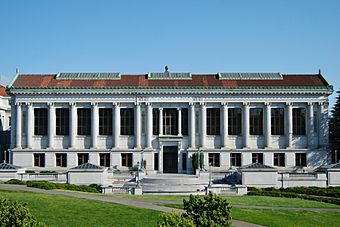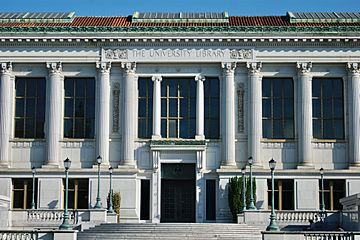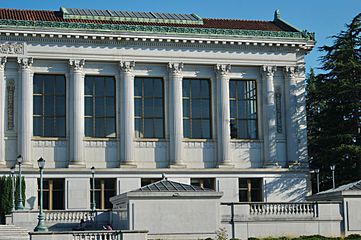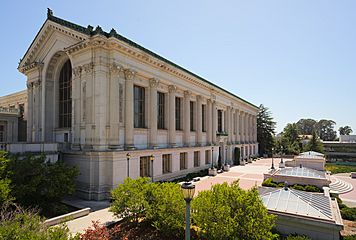Doe Memorial Library facts for kids
|
Doe Memorial Library
|
|

Doe Library from Memorial Glade
|
|
| Lua error in Module:Location_map at line 420: attempt to index field 'wikibase' (a nil value). | |
| Location | University of California, Berkeley Berkeley, California |
|---|---|
| Built | 1911 |
| Architectural style | Classical Revival |
| MPS | University of California, Berkeley MRA |
| NRHP reference No. | 82004639 |
Quick facts for kids Significant dates |
|
| Added to NRHP | March 25, 1982 |
The Doe Memorial Library is the main library at the University of California, Berkeley. It's a very important building on campus. The library is named after Charles Franklin Doe, who gave money in 1904 to help build it. It's located right in the middle of the UC Berkeley campus, next to the Bancroft Library.
Contents
History of the Library
In 1900, a person named Emile Benard won a contest to design the library. The building was finished in 1911. It was built in a Neoclassical style, which means it looks like old Greek and Roman buildings. The Doe Library holds many books for both college students and the main collections.
Exploring the Main Stacks
The Gardner Collection is a huge part of the library. It's named after David P. Gardner, who was the 15th President of the University of California. This collection is kept in a special four-story underground area.
What are the Main Stacks?
This underground area has 52 miles of bookshelves! It holds some of the university's most important books and collections. The Main Stacks were built in 1997. They have four big skylights that let natural light shine into the underground space.
Connecting the Libraries
The Gardner Main Stacks also connect the Doe Library to the Moffitt Library through an underground hallway. This makes it easy for students and staff to move between the two buildings.
The Old Book Storage
Before the Main Stacks were built, books were kept in an eight-story area inside the main Doe Library building. This space was called the Doe Core. It is 70 feet tall. The Doe Core has been used for temporary libraries when other buildings on campus needed to be made safer for earthquakes.
- Facade details
 | Janet Taylor Pickett |
 | Synthia Saint James |
 | Howardena Pindell |
 | Faith Ringgold |




